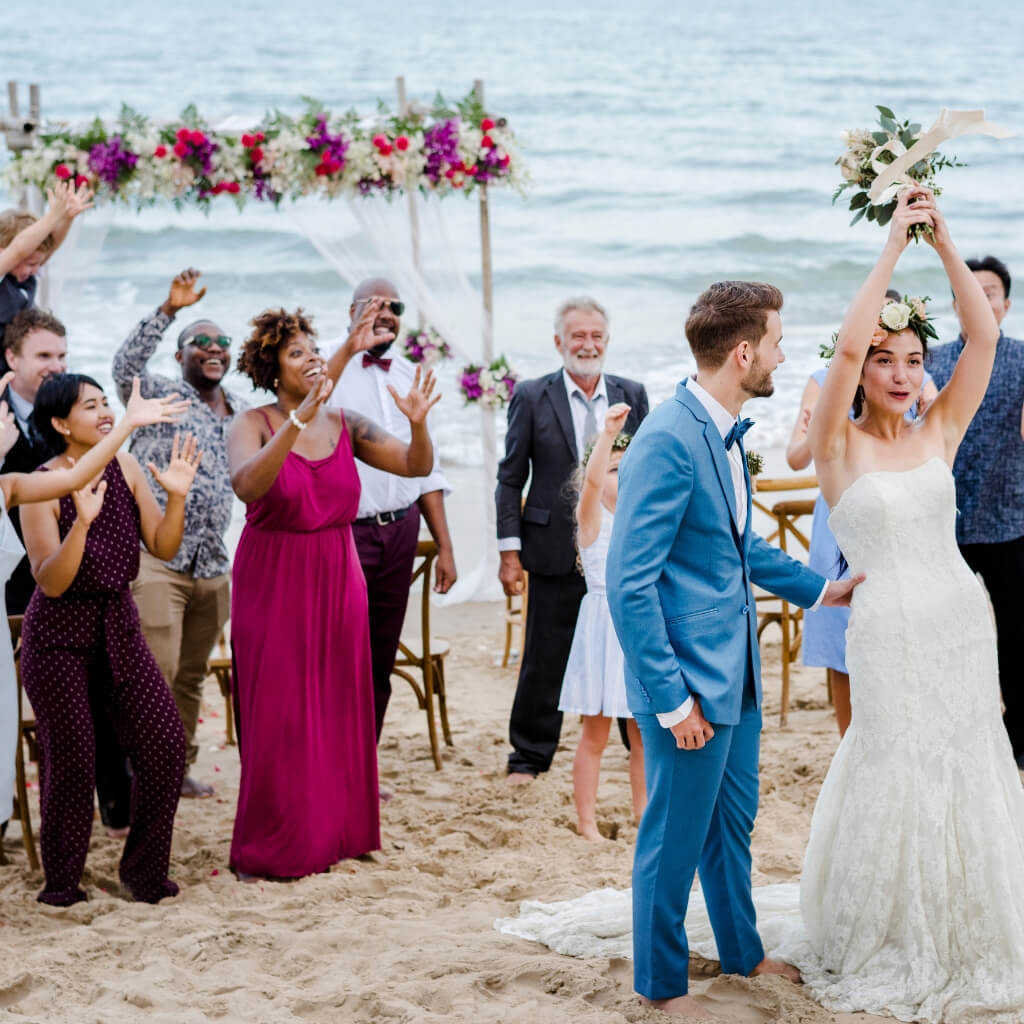🔥25% OFF- CODE VAL25 🔥
🔥25% OFF- CODE VAL25 🔥

Tossing the Wedding Bouquet – Why Would You?
March 20, 2020 3 min read
Tossing the Wedding Bouquet – Why Would You?
Five-tiered cake, embarrassing toasts, personalized wedding favors – the lengths a bride will go to for a memorable wedding day. Some are time-honored traditions, while others are fickle attempts to one-up your cousin. Either way, they get people talking, they liven up the party, and they mark the occasion.
Tossing the bouquet is one of those customs that some wedding guests specifically ask for while others hate with a passion. Like it or not, wedding bouquets bring down the house - or sometimes just the chandelier. But how is it that bouquets became lethal weapons? And how come so many brides in Brazil, Britain, and beyond have come to throw their bouquets at people, you ask?
The History of the Wedding Bouquet
As Modern Wedding so eloquently put it, flowers were initially worn by brides in Ancient Rome as garlands. These wreaths were a token of fertility, a symbol of new beginnings, and a way to seal the life-long pledge of loyalty long before the medieval custom of exchanging wedding rings developed. Speaking of which, it was in the Middle Ages that brides and grooms began to wear nosegays. These were initially small bouquets made of spices and fragrant herbs like dill, fennel, and thyme. In Elizabethan times, nosegays were mostly made of country flowers. They were worn to ward off misfortune, evil spirits, ill health, and unpleasant odors at a time when perfect cleanliness at large social gatherings wasn’t a given.
It seems that the concept of purposefully made wedding bouquets developed much later, in Victorian England. Flower arrangements with rich and fragrant blossoms were also very much in back then. Queen Victoria may have started the bouquet trend by carrying a tussie-mussie made of snowdrops at her wedding, as seen here. She was also presumably the source of another bridal trend: wearing a tiara adorned with orange blossoms to symbolize fertility.
The Wedding Bouquet Toss
The flowers in wedding bouquets were initially chosen very carefully for their symbolism. Wedding flower selections were like the bride’s trademark, representing traditional values like loyalty, purity, and fertility. Because wedding receptions were small, modest, and intimate gatherings usually held in the morning at the bride’s childhood home, most of those who came to church would leave with the memory of those flowers, rarely captured on camera.
In the early twentieth century, this changed. As grand dance halls turned into private venues after the world wars, newly-weds could have grand wedding balls instead. Floral arrangements became much more elaborate. Wedding bouquets, wrist corsages, and boutonnieres needed to match the general theme of the event and the venue.
Why is it then, that having gone through all the trouble of finding a bouquet she likes, the bride parts with it – and with such hostility, too? Various sources claim this was traditionally done to appease the hordes of people who wanted a souvenir from the lucky bride. But given the fact that wedding receptions, as we know them today, were virtually non-existent 50 years ago outside of royal courts, it’s unlikely. It simply has to do with timing.
Tossing the bouquet is one of the many customs carried out when the party is in full swing. Before the cake cutting, actually, according to The Knot's wedding reception timeline. The elderly usually retire by then, leaving the youngsters to their own devices, namely garters. The customs of tossing the bouquet and the garter were linked. The bachelor who caught the garter would place it on the leg of the young girl who caught the bouquet. Single men and women flocked to fill the ranks of prospective bouquet and garter catchers.
Today, both customs have fallen out of favor. Without this link between the bouquet and the garter, these competitions are less of an incentive for younger guests to stay on until the end, and more a way to fill in time. Some even see it as a rude way to single out the singles. After all, they have a point. As people gawk at the spinsters aligned in a row, ready to come face to face with their destiny – at times a bush swiftly delivered to the noggin – not once do they ask themselves if the young ladies are in pursuit of a partner, let alone a marriage.
Leave a comment
Comments will be approved before showing up.

